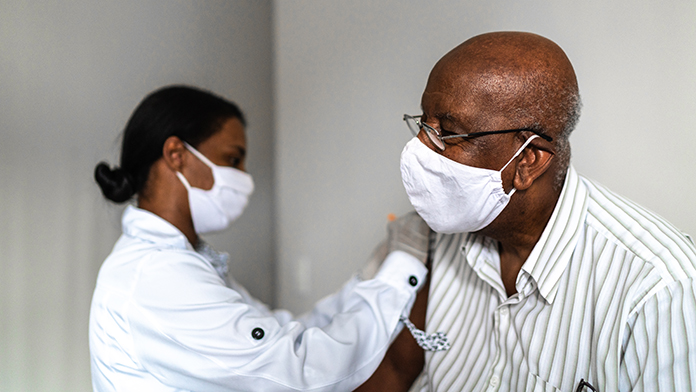The information you will be accessing is provided by another organization or vendor. If you do not intend to leave our site, close this message.
D-SNP home page > Health tips & tools > Your complete cold, flu and COVID-19 shopping guide
Your complete cold, flu and COVID-19 shopping guide
Stock up on these essential health and wellness items now so you can take care of yourself later if sickness strikes.
 By Stacey Colino
By Stacey Colino
The last thing you want to do when you’re injured or feeling sick is run to the store for bandages or medication. Having the right supplies at home makes it easier to stay healthy.
Not sure which over-the-counter, or OTC, items you need in your medicine cabinet? We can help! At Aetna®, our goal is to make it easier to feel your best. Here’s our list of OTC essentials to stock up on.
#1. Acetaminophen or ibuprofen. Both OTC medications help reduce fevers, headaches and body aches and pains. Ask your doctor which one is best for you.
#2. Decongestant. This medication helps relieve sinus pressure and congestion so that you can breathe easier. If you have high blood pressure or a heart condition, talk to your doctor before taking a decongestant, which can affect your heart rate or interfere with heart medications.
#3. Cough medicine. For daytime use, look for a cough medicine that has an expectorant to help thin out chest congestion. If your coughing is keeping you awake at night, you’ll also want a cough suppressant so that you can get the sleep you need to recover.
#4. Digital thermometer. It’s the only reliable way to tell if you’re running a fever.
#5. Topical pain reliever. Apply this to your skin to help ease arthritis or muscle pain. It comes in a cream, gel, spray or patch. Avoid those made with salicylates if you’re allergic to aspirin or taking a blood thinner.
#6. Antihistamine. This OTC medication can help ease allergy symptoms such as sneezing, watery eyes, itchy skin and hives. You can take antihistamines as a pill, nasal spray or eyedrops.
#7. Antacids and laxatives. Both are good to have on hand for occasional digestive issues. Laxatives can be helpful for constipation. Look for one with polyethylene glycol or senna for speedy relief. Struggle with heartburn? Antacids can quickly ease symptoms by neutralizing stomach acids. But they can interact with some medications, so ask your doctor if they’re right for you.
#8. First-aid kit. A must for every home, your first-aid kit should be stocked with three key items: an antiseptic to clean out cuts and scrapes; an antibiotic ointment to help kill bacteria and prevent infection; and bandages to help keep out dirt and germs.
When you’re not feeling well, having the right supplies at home frees you up to focus on what’s most important: resting and recovering. Many Aetna® members with a Dual Special Needs Plan, or D-SNP, get a quarterly allowance to purchase certain decongestants, cough medicine and other approved OTC health and wellness items.
To learn more ways an Aetna® D-SNP could help you get the care you need, visit AetnaMedicare.com/DSNPInfo.
The last thing you want to do when you’re feeling sick, achy or feverish is go out to pick up medication or chicken noodle soup. You can do everything you can to fend off those symptoms — including getting vaccinated for the flu and COVID-19 and taking care of your immune system. But even if you do, germs sometimes slip through your defenses. Plus, there’s no vaccine (yet) for the common cold.
That’s why it’s a good idea now to make sure you have all the right supplies at home. So if you do get sick, you can focus on what’s most important: resting and recovering. Think of it as building your cold-flu-COVID-19 survival kit. Here are the essentials to stock up on in addition to your regular prescription medications and other key medical supplies. And as always, talk to your doctor before taking any over-the-counter medications if you have any chronic medical problems.
What to have in your medicine cabinet
- Acetaminophen or ibuprofen: Both over-the-counter (OTC) medications will help reduce fevers, headaches and body aches and pains from any cold or virus.
- Decongestants: “They relieve pressure and congestion by shrinking blood vessels in the nose, so they don’t block the airways,” says Neil Schachter, M.D. He’s a professor of medicine at the Icahn School of Medicine at Mount Sinai in New York City. (Note: If you have high blood pressure or a heart condition, talk to your doctor before taking a decongestant. The OTC medicines can affect your heart rate or interfere with heart medications.)1
- Antihistamines: These medications limit the action of inflammatory compounds that produce sneezing, throat pain and congestion from a cold, says Dr. Schachter. He’s the author of The Good Doctor’s Guide to Colds & Flu.
- Cough medicine: Turns out, coughing is a beneficial reflex. It helps clear out foreign things from your airways, including pathogens such as viruses.2 So in general, steer clear of cough suppressants. “Get a cough medicine that contains an expectorant to help thin out and loosen up mucus if you have chest congestion,” says Jeffrey Landsman, M.D. Dr. Landsman is board-certified in family, lifestyle and geriatric medicines at Mercy Medical Center in Baltimore. One exception: If you have a cough that’s keeping you up at night, says Dr. Landsman. Coughing through the night can cause stress, which can make cold symptoms worse. In this case a suppressant makes sense.
- Cough drops/throat lozenges: These can soothe your throat if it’s irritated by coughing or postnasal drip.
- Saline nasal spray: It eases nasal congestion for one, Dr. Schachter says. Plus, a saline nasal spray can wash out bacteria-filled mucus. This can prevent a sinus infection.
- Thermometer: There’s just no other reliable way to tell if you’re running a fever.
- Rubbing alcohol: Use this to disinfect your thermometer after each use.
- Zinc lozenges: Taking zinc acetate lozenges within 24 hours of the onset of cold symptoms has been shown to help people recover faster from the common cold.3 Zinc may work by preventing the virus that causes colds from multiplying.4
- Pulse oximeter: The COVID-19 pandemic brought attention to this device. You put it on a fingertip, and it uses light beams to estimate your blood-oxygen level and pulse rate. Dr. Landsman recommends having one on hand. “Normal oxygen levels are typically above 95 percent,” he says. “If oxygen saturation drops below 90 percent, then you should be urgently evaluated.”4
What to have in your kitchen
- Chicken soup: Believe it or not, research has found that chicken soup really does help ease symptoms from upper respiratory infections. The ingredients appear to have anti-inflammatory actions.5 Consider it the ultimate comfort food!
- Sports drinks with electrolytes: Sipping on a sports drink or electrolyte solution (such as Pedialyte®) can help you stay hydrated, Dr. Landsman says. That’s important for loosening up congestion.
- Tea: Research suggests that drinking tea can help boost immunity against viral infections. The credit goes to natural compounds in tea called catechins.6 Plus, sipping hot tea just feels soothing when you have a sore throat, says Dr. Landsman.
- Table salt: It’s helpful to gargle with saltwater if you have a sore throat or sores in your mouth, says Dr. Landsman. It may help reduce swelling or irritation in the throat.7 He recommends gargling with a mixture of warm water (about 8 ounces) and ½ teaspoon of salt three to four times a day if you have a sore throat.
What to have in your supply closet
- Disinfectant sprays and wipes: These are important for cleaning commonly touched surfaces in your home to stop the spread of germs when someone in the family is sick. Germ hot spots include doorknobs, light switches, countertops and TV remotes.
- Tissues: They’re essential to have on hand when drippy noses and sneezing are going on.
- Disposable gloves: Wear these if you’re cleaning up after someone who has a contagious illness. They can help protect you from those germs, Dr. Landsman says.
- Masks: These can help protect you if you’re caring for someone who is sick. Or if you’re sick, masks can help prevent you from spreading a virus to others.
- Humidifier or vaporizer: Dry air causes sinuses to dry out. This means there’s less sticky mucus to trap the viruses you breathe in and keep you from getting sick. Humidifiers and vaporizers fill the air with moisture. That can be a blessing for stuffy noses and sore throats. “You need to keep [humidifiers and vaporizers] super clean to avoid bacterial growth,” Dr. Landsman says. He advises that you regularly empty out the water, rinse them out and dry them thoroughly.
Finally, be sure to get your vaccines for the flu and COVID-19 if you haven’t already. Because when it comes to preventing both viruses, the best defense is a good offense.
1Cleveland Clinic. Are OTC allergy and cold medications making your heart race? June 28, 2018. Accessed June 12, 2022.
2Dhand R and Li J. Coughs and sneezes: their role in transmission of respiratory viral infections, including SARS-CoV-2. American Journal of Respiratory and Critical Care Medicine. September 1, 2020, 202(5): 651-659.
3Hemilä H, Fitzgerald JT, Petrus EJ, et al. Zinc acetate lozenges may improve the recovery rate of common cold patients: an individual patient data meta-analysis. Open Forum Infectious Diseases. Spring 2017; 4(2): ofx059.
4Mayo Clinic. Zinc for colds: the final word? August 8, 2020. Accessed June 12, 2022.
5Rennard BO, Ertl RF, Gossman GL, et al. Chicken soup inhibits neutrophil chemotaxis in vitro. Chest. October 2000; 118(4): 1150-1157.
6Furushima D, Ide K, and Yamada H. Effect of tea catechins on influenza infection and the common cold with a focus on epidemiological/clinical studies. Molecules. July 2018; 23(7): 1795.
7Cleveland Clinic. Sore throat remedies that actually work. December 9, 2019. Accessed June 12, 2022.



